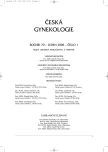Abdominal hysterectomy – Risk Factor in Development of Urinary Incontinence? Results of a Questionnaire Study
Abdominální hysterektomie – rizikový faktor vzniku močové inkontinence? Výsledky dotazníkové studie
Cíl studie:
Zhodnocení rizika vzniku močové inkontinence po hysterektomii u žen operovaných pro benigní gynekologické onemocnění.
Typ studie:
Retrospektivní dotazníková studie.
Název a sídlo pracoviště:
Gynekologicko-porodnická klinika 2. LF UK a FN Motol, Praha.
Metodika:
Dotazníková studie žen, kterým byla na naší gynekologicko-porodnické klinice provedena v době od ledna do prosince 2001 abdominální hysterektomie pro benigní gynekologické onemocnění. Dotazník obsahoval otázky zaměřené na hodnocení symptomů stresové, urgentní a smíšené močové inkontinence ve vztahu k věku, paritě, hormonálnímu stavu a indexu tělesné hmotnosti. Pro statistickou analýzu byl použit Studentův t-test.
Výsledky:
Z celkového počtu obeslaných pacientek odpovědělo 114 operovaných žen (59,7 %). Po operaci vznikla močová inkontinence de novo u 15,8 % pacientek (18 ze 114). Čistou stresovou inkontinencí trpělo v této skupině 77,8 % žen (14 z 18). Zbylé čtyři ženy měly symptomy smíšené inkontinence.
Výsledky studie upozorňují na 13,1 % žen (15 ze 114), u kterých předoperačně existující stresová inkontinence přetrvávala i po hysterektomii. U 6,1 % (7 ze 114) operovaných předoperační stresová inkontinence vymizela. Věk, parita, hormonální stav, index tělesné hmotnosti nebyly v jednotlivých skupinách statisticky významně odlišné.
Závěr:
Výsledky studie prokázaly poměrně vysoké riziko vzniku stresové močové inkontinence po abdominální hysterektomii u původně kontinentních žen. Výsledky rovněž upozornily na perzistenci symptomů stresové inkontinence u žen, které před operací neinformovaly o své inkontinenci, přestože na ni byly aktivně dotazovány. Zlepšení osvěty, zejména upozornění na možnost vzniku močové inkontinence po hysterektomii a na možnost chirurgické léčby existující stresové inkontinence současně s hysterektomií, je jedním z nejdůležitějších aspektů zefektivnění současné gynekologické chirurgické terapie.
Klíčová slova:
ženská močová inkontinence, abdominální hysterektomie, dotazník
Authors:
Roman Chmel
; Marta Nováčková
; Zlatko Pastor
; R. Vlk; L. Horčička; M. Pluta; Lukáš Rob
Authors‘ workplace:
Gynekologicko-porodnická klinika 2. LF UK a FN Motol, Praha, přednosta doc. MUDr. L. Rob, CSc.
Published in:
Ceska Gynekol 2005; 70(1): 53-56
Category:
Original Article
Overview
Objective:
To evaluate the risk of urinary incontinence development after abdominal hysterectomy for benign gynecological disease.
Design:
Retrospective questionnaire study.
Setting:
Obstetrics and Gynecology Department, Charles University 2nd Medical Faculty and Teaching Hospital Motol, Prague.
Methods:
Questionnaire study of women in which abdominal hysterectomy for benign gynecological disease was performed from January till December 2001 at our Department of Gynecology and Obstetrics. The questionnaire included questions about symptoms of stress, urge and mixed urinary incontinence. They were evaluated in connection with age, parity, hormonal status and body mass index. Student t-test was used for the statistical analysis.
Results:
114 (59.7 %) from all sent-out questionnaires were obtained. In 15.8 % cases (18 from 114) de novo urinary incontinence after surgery developed. 77.8 % (14 from 18) from these patients suffered from gennuine stress incontinence. The rest (4 from 18) of the women had symptoms of mixed incontinence. Study results draw attention to 13.1 % women (15 from 114) in which preoperative stress incontinence persisted even after hysterectomy. Preoperative stress incontinence was cured in 6.1 % (7 from 114) cases after hysterectomy. Age, parity, hormonal status and body mass index were not statistically different in all groups after surgery.
Conclusions:
The results of the study show relatively high risk of urinary incontinence development after abdominal hysterectomy in previously continent women. The results also show high persistence of the stress incontinence symptoms in women who did not inform about their incontinence even if they were asked about it. Higher quality of further health education of the women with drawing their attention to both the possibility of surgical treatment of urinary incontinence simultaneously with hysterectomy are the most important aspects how to make the current gynecological surgical therapy more effective.
Key words:
female urinary incontinence, abdominal hysterectomy, questionnaire
Labels
Paediatric gynaecology Gynaecology and obstetrics Reproduction medicineArticle was published in
Czech Gynaecology

2005 Issue 1
-
All articles in this issue
- New Options in Pharmacological Treatment of Urge Urinary Incontinence in Women
- Importance of Registry of Aggregated Data on Women Giving Birth
- Analysis of Maternal Mortality in the Czech Republic in 2001
- Analysis of Present Diagnostic Methods of Intrapartal Fetal Hypoxia
- Contribution of Doppler Examination in Pregnancy at Risk of Alloimune Fetus Anemia
- Risk Factors of the 3rd and 4th Degree Tear during Delivery
- Birth Defects in the Czech Republic – Expected Incidence in the Coming Years
- Pelvic Exenteration
- Possibilities of Increased Radicality in Pelvic Exenteration
- Abdominal hysterectomy – Risk Factor in Development of Urinary Incontinence? Results of a Questionnaire Study
- MMP-26 mRNA and Estrogen Receptor Alpha Co-expression in Normal and Pathological Endometrium
- Protein bcl-2 Expression in the Mid-secretory Endometrium after Oral Estrogen-Progesterone Preparation
- Syndrome of Pseudomyxoma Peritonei – Description of Three Cases and Survey of the Problem
- Cystic Hypersecretory Carcinoma: Rare and Potentially Aggressive Variant of Intraductal Carcinoma of the Breast. Report of Five Cases
- Czech Gynaecology
- Journal archive
- Current issue
- About the journal
Most read in this issue
- Abdominal hysterectomy – Risk Factor in Development of Urinary Incontinence? Results of a Questionnaire Study
- Risk Factors of the 3rd and 4th Degree Tear during Delivery
- Syndrome of Pseudomyxoma Peritonei – Description of Three Cases and Survey of the Problem
- Contribution of Doppler Examination in Pregnancy at Risk of Alloimune Fetus Anemia
